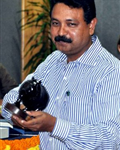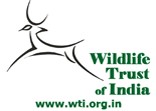
Dr. Rathin Barman – Chief Strategy and Liaison (North-East)
A wildlife biologist by training, Dr Rathin Barman has been associated with the Wildlife Trust of India since 2001. He joined as a manager. Rathin has been instrumental in the organisation’s growth in the Northeast and is currently Joint Director of WTI and Head – Centre for Wildlife Rehabilitation and Conservation.
Rathin is an alumnus of Gauhati University. He did post-graduation in zoology with specialisation in animal ecology and wildlife biology. In 1998, he was awarded a doctorate for his research on “An ecological analysis of the wetlands in relation to waterbird diversity of Brahmaputra Valley, Assam”.
He has undergone a special training in Conservation and Management of Wildlife from Smithsonian Institution, US, organised by Wildlife Institute of India (WII) in 1994 and trained in Environment Education by the North American Association of Environmental Education in 1997. He also holds a Durell Endangered Species Management Graduate certificate.
Since the early 1990s, Rathin has been associated with a number of diverse projects in his home state of Assam and other Northeast states. He has implemented surveys of birds, studies and projects on human-elephant conflict mitigation, awareness campaigns, policy formulation and community-based conservation projects, in collaboration with agencies and institutions including Gauhati University, WII, and other local and international NGOs.
At WTI, Rathin works with a team of wildlife biologists on diverse projects including elephant corridor securement, human-animal conflict mitigation, and wildlife rehabilitation.
He is in charge of WTI’s Rhino Reintroduction Project that has successfully rehabilitated three handraised rhinos in Manas National Park since 2005, initiating the reintroduction of the species in the protected area that lost all of its 100-odd rhinos by the early 2000s. He also coordinates the Elephant Reintegration Project in Manas and Wild Buffalo Rehabilitation Project in Dibru-Saikhowa National Park.
“One of the projects that’s closest to my heart is reintroduction of rhinos in Manas. In 2006, the project began relocating handraised rhinos from CWRC. Releasing these rhinos in the wilderness was one of the most satisfying moments of my life,” recalls Rathin.
Rathin, along with Dr Bhaskar Choudhury, were key members of the team that established the Centre for Wildlife Rehabiltation and Conservation (CWRC) near Kaziranga National Park– India’s first wildlife rehabilitation centre near a protected area. Rathin oversaw the site selection, acquisition of requisite permits, and construction of the centre. He was its first Manager, serving for five years beginning in 2002. CWRC is a joint venture of the Assam Forest Department and International Fund for Animal Welfare – Wildlife Trust of India.
“Rathin was very crucial in the establishment of CWRC. He took care of all minor details including selecting material for construction of the building and overseeing the construction,” says a colleague.
Since his college years, Rathin has authored/co-authored a large number of scientific papers and publications. “Wildlife was a new field when we started out. During the final year of my MSc, a few friends and I decided that we wanted to do something different. We started reading and discussing wildlife issues, learnt birdwatching, and so it went. All of us are now established in this field,” recollects Rathin.
Known for his liaisoning skills, Rathin plays a key role for WTI in Assam. Several of his junior colleagues share that they have benefited from his leadership. Others vow for his puntuality, meticulous planning, hard-work, anticipation and prevention of crises, persuasiveness, his skills to convince people and his ability to get things done as required.
Rathin is a member of the IUCN SSC Asian rhino specialist group and threatened waterfowl specialist group.
His hobbies include photography and painting. He is also a good badminton player.
